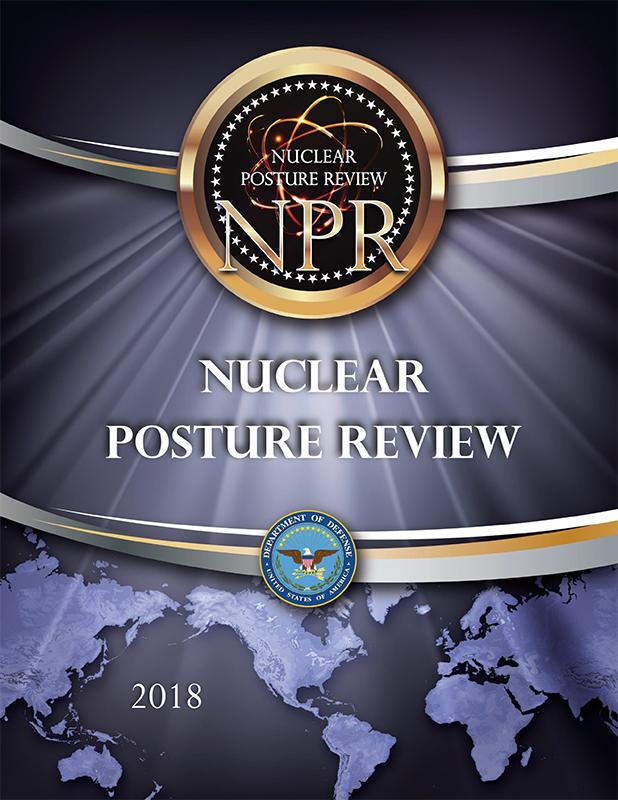|
UN Office
International Association of Lawyers Against Nuclear Arms
|
|
| |
We have been working hard to respond to multiple developments in the nuclear sphere - very troubling ones in the case of the United States and Russia, and contradictory ones in the case of the US-North Korea confrontation. See this eNews for more.
As always, your financial support is greatly appreciated - and needed!
Best wishes for a peaceful Spring,
John Burroughs
|
Threatened US-Russian Nuclear Arms Racing
Vladimir Putin's March 1 speech and the US Nuclear Posture Review released on February 2 demonstrate that Russia and the United States are poised to resume nuclear arms racing on a scale not seen since the dark days of the Cold War. In a major address to Russia's Federal Assembly, Putin described several new nuclear weapons delivery systems, including a nuclear-powered cruise missile and an underwater drone carrying "massive nuclear ordinance", all intended to overcome U.S. missile defenses.
 The Nuclear Posture Review proposes two new capabilities, both aimed at Russia, a low-yield warhead deployed on submarine-launched missiles, and a sea-based, nuclear-armed cruise missile. It endorses existing plans to sustain and upgrade existing nuclear forces and infrastructure to the tune of well over a trillion dollars over the next three decades. The review also lowers the threshold for use of nuclear weapons, emphasizing the role of such weapons in responding to "non-nuclear strategic attacks," notably cyberattacks. For more, see this paper by LCNP President Guy Quinlan and Executive Director John Burroughs,
A Prescription for Disaster: Trump's Nuclear Posture Review. The paper will be the basis for advocacy in Washington.
Russian-US nuclear arms racing is dangerous in itself. It also is contrary to the Nuclear Non-Proliferation Treaty (NPT) obligation to "pursue negotiations in good faith on effective measures relating to cessation of the nuclear arms race
at an early date". The "early date" has long since passed! - the NPT entered into force in 1970. In an in-depth Truthdig article,
US-Russian Nuclear Arms Racing: Still Crazy After All These Years, Andrew Lichterman of Western States Legal Foundation, an IALANA affiliate, and Burroughs specify the international law that the Russian and US programs blatantly disregard, and examine the political and military origins of the current adversarial relationship.
Russia and the United States should seize every opportunity to put the threatened nuclear arms race in reverse. And the world's states must make clear that the Russian and US postures are completely unacceptable. Opportunities include the UN Disarmament Commission, now meeting until April 20; the NPT PrepCom, April 23 - May 4; and the UN High-level Conference on Nuclear Disarmament, May 14-16. In a March 28
UN press briefing (video
here), Burroughs, Jackie Cabasso of Western States Legal Foundation, and Alyn Ware of Parliamentarians for Nuclear Non-Proliferation and Disarmament address the current nuclear landscape and the opportunities presented by the High-level Conference and other forums.
Also deserving of attention are the excellent, probing contributions on presidential authority to use nuclear weapons and on nuclear arms generally in this
collection put together by Public Books based on a Harvard conference last November organized by Elaine Scarry and others. It includes a piece by Burroughs on international law and first use of nuclear weapons along with contributions by Rep. Jim McGovern, William Perry, Bruce Blair, Rosa Brooks, Kennette Benedict, Bruce Ackerman, Zia Mian, Hugh Gusterson, and Sissela Bok.
|
The US-North Korea Confrontation: Contradictory Signals
With the upcoming summit meeting between South Korean President Moon Jae-in and Chairman
 |
|
 |
Jackie Cabasso at UN press briefing.
|
Kim Jong-un of North Korea, and the planned May summit meeting between President Trump and Kim, there is some reason for hope that war will be averted. More than 100 US civil society groups, including LCNP, signed on to an
open letter to the three leaders welcoming these developments. Jackie Cabasso released the letter at the March 28 press briefing.
However, Trump's appointment of John Bolton as the new national security advisor is a most troubling step. In a March 1 Wall Street Journal opinion piece, Bolton unambiguously called for a preventive US military strike on North Korea. On March 8, the Journal published a letter by Andrew Lichterman and John Burroughs, "Striking North Korea First Is a Bad Proposal". It reads as follows:
In "The Legal Case for Striking North Korea First" (op-ed, March 1) John Bolton argues, in essence, that the mere possession of nuclear weapons and long-range delivery systems by an adversary constitutes an "imminent threat," justifying an immediate use of force.
By Mr. Bolton's measure, North Korea has a better case for preventive action than does the U.S. Our forces regularly exercise outside North Korean territory. The U.S. has already deployed nuclear delivery systems capable of utterly destroying North Korea, a force far more threatening than North Korea's fledgling nuclear arsenal.
The United Nations Charter forbids the threat or use of force except in self-defense or when authorized by the U.N. Security Council. Threats to peace - which do indeed exist in the confrontation between North Korea and the U.S. - must be referred to the Security Council. In all of its resolutions on the matter, the Security Council has stressed the need to pursue a peaceful resolution of this dangerous standoff. The council has been clear in its refusal to authorize the use of military force by any party.
Mr. Bolton's position is dangerous nonsense. He would have us drive a final nail in the coffin of international law and quite possibly in the coffin of civilization.
|
|
|
|
| |
|